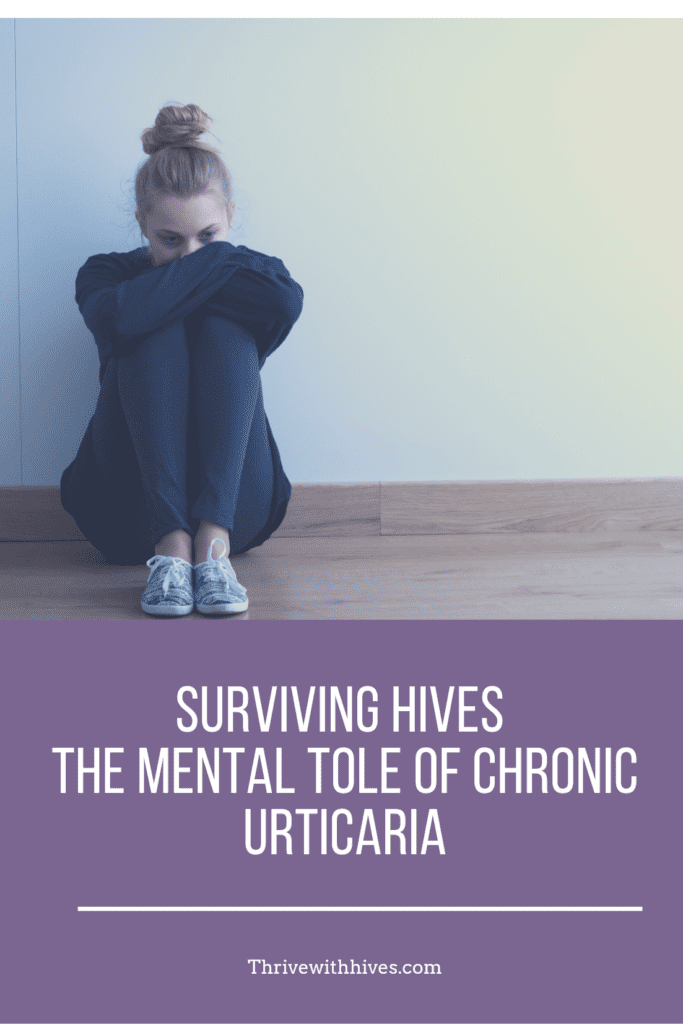Surviving hives- The mental toll of chronic urticaria
The mental toll of chronic urticaria can take over your life. Chronic Urticaria is a mast cell disorder that can be itchy, painful, embarrassing, and have a vast impact on quality of life. I know this from personal experience.
Luckily there are treatments for chronic urticaria which have been proven to significantly reduce the number of days with symptoms. These medications often take a lot of experimenting to find the right fit and it can be challenging to go through this.
When you have chronic urticaria you may also be suffering from insomnia, anxiety, depression, social isolation, and systemic symptoms.
You may need more than just medication- prioritizing mental health can also help improve your day-to-day life with chronic urticaria. The sooner you address any mental health issues the easier they will be to manage. Read on below for tips on how best to prioritize your mental health when living with chronic urticaria.

How does Chronic Urticaria affect quality of life
Those with chronic urticaria may experience sleep deprivation, lack of energy, social isolation, and a variety of systemic symptoms. Some experience tissue swelling, also known as angioedema. A small percentage can even experience anaphylaxis. These can cause a significant deterioration in the person’s quality of life.
As the admin of the support group for women with chronic urticaria, I have had numerous women private message me mentioning struggles with depression and even suicidal ideation. It’s incredibly sad and frustrating that a condition that has such an impact on our lives is often dismissed by our physicians, family, and friends.
I struggled with this in my journey as well. My physician was very dismissive of my symptoms and even suggested that my depression was the reason for my hives when in reality the hives were the cause of my depression. I was horribly depressed and had suicidal thoughts. I felt hopeless and alone. It was a very dark place in my life that I had to work hard to pull myself back out of.
“Depression does not cause chronic urticaria. Urticaria causes depression”
-Dr. Marcus Maurer
See what else Dr. Maurer has to say about chronic urticaria HERE.
Chronic Pain and quality of life in chronic urticaria
Chronic pain has got a lot of press because of the impact on quality of life.
Pain is called the 5th vital sign in nursing. In Michigan, where I am licensed, nurses are required to take continuing education on pain every time we renew our licenses.
This shows that quality of life for those with chronically itchy skin (pruritis) have similar quality of life scores compared to those with chronic pain. Many with Chronic Urticaria also suffer from chronic joint pain and are at higher risk for other painful disorders such as rheumatoid arthritis and fibromyalgia.
I have personally experienced both chronic urticaria and chronic pain. Although everyone’s experience is unique, and the amount and severity will vary, I found them to be comparable.
When I have a CSU flare, it’s hard to think of anything else. I feel the same way when I have chronic pain flares. They both can lead to insomnia, depression, isolation, and a generally crabby disposition. They both are frequently dismissed as mental issues in women and can leave you frustrated and confused.
I’m not trying to discount pain, rather, show that there is a similar impact on quality of life.
Chronic Urticaria needs to be taken more seriously by the medical community.
Why therapy is important for people with chronic illness
Therapy helps people explore their thoughts and feelings about their condition. It can assist in developing new coping skills or finding relief from emotional pain by understanding how it affects them emotionally.
When we are stressed, we experience inflammation. Stress can actually trigger the mast cells and lead to higher histamine levels, something that we are already overwhelmed with.
This article discusses the implications of stress leading to chronic diseases. “Mast cells become highly activated in response to stressful situations the body may be experiencing. When this happens, CRF1 tells these cells to release chemical substances that can lead to inflammatory and allergic diseases such as irritable bowel syndrome, asthma, life-threatening food allergies and autoimmune disorders such as lupus.” -Adam Moeser, an associate professor and endowed chair who specializes in stress-induced diseases.
It’s important to have the tools in place to properly manage stressful situations.
Past trauma can stay with us for years to come and ultimately impact our health. If you have trauma in your past, it’s important to process those memories with a licensed professional.
According to The National Council for Behavioral Health, approximately 70% of the population has experienced a traumatic event in their lifetime. The negative psychological and physical effects of trauma don’t always resolve on their own and have the potential to extend far beyond the actual event.
Aside from therapy, it is important to utilize stress management tools and techniques like meditation, yoga, emotional freedom technique, breathing exercises. Find what works best for you and implement it in your daily practice. Stress relief should be a priority in your care plan.
The importance of having a strong support system in place
If you are lucky, you have friends and family that you can lean on. Unfortunately, due to the common misconceptions and lack of knowledge about this disease, many of us find that we do not get support from those closest to us.
Finding the right support and learning to manage your illness can be difficult. It’s important that you surround yourself with people who understand what it feels like, otherwise, they may not have adequate empathy and can leave you feeling even worse.
Achieving wellness doesn’t always mean putting complete faith into someone else – sometimes making decisions ourselves allows greater personal accountability. This doesn’t mean going against the doctor’s orders or not taking medications. It means that we do what we can to live a healthy lifestyle.
If you aren’t already a member-Click Here to join the Thrive with Hives support group for women with chronic urticaria.
Coping strategies
Chronic Urticaria can be a stressful, exhausting, and isolating experience that has a significant impact on your mental health. It is important to take care of yourself by prioritizing your mental health and surrounding yourself with a strong support system that includes family members, friends, counselors, or therapists.
There are many ways you can cope with chronic illness so it doesn’t have to feel like it defines who you are. You should also focus on staying otherwise healthy– research has shown that people living with chronic illnesses often fare better if they maintain an active lifestyle which may include regular exercise, adequate sleep, and eating well-balanced meals rich in fruits and vegetables.
Learning stress management techniques like meditation should be an important part of your care plan with chronic urticaria.
Not sure how to get started? Check out my free mini-guide on meditation Find Your Zen.
Suicide Prevention
Chronic Urticaria patients often struggle with depression and some contemplate suicide. This is why it really bothers me when physicians, family members, friends, colleagues, etc do not take it seriously.
This condition can have a massive impact on our lives and has the ability to drive us mad. I often wonder how many have actually gone through with those thoughts of self-harm?
I hope that doctors (and family members) start to take this more seriously so we can prevent this kind of tragedy from happening. I admit that I had these kinds of thoughts in the first few years of dealing with this.
If you are feeling suicidal, please reach out to a therapist, a doctor, a trusted friend. You can call the suicide hotline any time of day or night or visit their website SuicidePreventionlifeline.org.
Here is the suicide hotline where you can talk to someone free of charge: 800-273-8255

https://msutoday.msu.edu/news/2018/heres-how-stress-may-be-making-you-sick